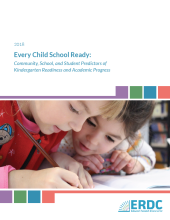Kindergarten readiness is highly predictive of subsequent academic success, which in turn is predictive of health and wellbeing and economic success. In addition, the demands of growing up poor become a shared risk for residents in low income communities (in addition to the individual risk factors). Prior researchers have established that poverty – as a community characteristic – has a major impact on social success, emotional wellbeing, and health in individuals.
This leads to a relevant series of research questions: Do community characteristics help explain differences in school readiness across Washington State communities? In other words, do risk factors prevalent within a community – regardless of whether they are experienced by individual students – help account for variations in whether children are prepared for kindergarten? This report uses four years of data from the Washington Kindergarten Inventory of Developing Skills (WaKIDS) assessment, coupled with early academic progress for more than 150,000 students, to help answer these questions.
We found that the level of poverty within a community was a statistically significant predictor of community differences in kindergarten readiness. In other words, whether or not a child grows up in a low income home, growing up in a low income community has a statistically significant (negative) impact on their kindergarten readiness. The percent of students who were Hispanic, and the percent of students who were English language learners (ELLs), were also statistically significant predictors. Further, the number of adverse childhood experiences (ACEs) within a community was associated with decreased kindergarten readiness on some WaKIDS measures but not others.


